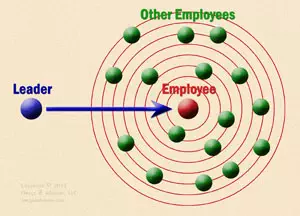Change management consultant Mike Lehr helps leaders deal with office politics. He is President of Omega Z Advisors.
Office politics is a major source of tension in the workplace. They affect employees and managers alike. They are a low-level form of conflict. They lay the groundwork for more severe conflicts.

When relationships are good, we call it teamwork. When they are not, we call them office politics.
These low-level conflicts can destroy productivity. They can discredit leaders. They can undermine teams and organizational culture.
What are Office Politics?
In order to deal with office politics, we need to look at them in a different light. That means an office politics definition where we see them as relationships. We might see them as bad ones though. That is all right.
When we have good relationships with others, we call it teamwork. When we do not, we call it politics. When we say, “I have a relationship with someone,” it implies a good one. If we do not have a good one, we often respond, “I do not have a relationship there.”
In this light, office politics is a natural part of the workplace. That is because relationships are. Relationships are important to business. They are important to the workplace. They get things done.
Wherever we find relationships, we will find politics. It is unavoidable. Politics are the snails. Relationships are the escargot. Office politics and relationships are the same thing.
How to Deal with Office Politics
Managers must see that they add to office politics. They do this with their actions and decisions. This happens unintentionally many times.

Employees like to talk about their interactions with leaders and managers with other employees.
The relationships managers have with their employees become fodder for office politics. That fodder is not based on what managers think those relationships are. It is based on what others think they are.
Employees like to discuss their managers and leaders. They like to discuss the relationships they and others have with them. Competition for attention enters too. Office politics is most destructive when leaders do not see how they add to them.
Managers often do this by giving employees’ more or different access to them than to other employees. They might socialize with some more than others. Common interests affect access. All of these play out more so in family businesses.
Dealing with Office Gossip
We easily look at gossip as a nuisance. That encourages us to avoid dealing with office gossip. Gossip are perceptions. Perceptions are reality. They fuel office politics too. Dealing with office gossip is about managing perceptions.
Managers and leaders are quasi-celebrities in their firms. That means they are targets of gossip. People watch celebrities closely. Employees watch their leaders closely. Leaders must manage the impressions they make. That means managing their personae.
Most managers’ policy is to avoid gossip. At best, they harshly disapprove it. Managers become complicit when they are not dealing with office gossip. They fuel it when they do not think about their relationships with each and every employee.
Managing Conflict in the Workplace

Even in a small group of 8 there are 28 different relationships that can challenge conflict management strategies.
Conflict can be an excellent source of innovation. When this conflict becomes more relational than professional, it can be destructive.
The best way to manage conflict is to spot it early. Conflict management training helps. Paying attention to office politics and gossip does too. It is neither possible nor healthy to remove all conflict. It is assuming that conflict is always there.
Managing conflict is about managing office politics. In turn, this is about managing relationships. Again, managers do this by being aware of the relationships they have with each employee.
They manage that relationship. They do so from two views. One is from the view of the employee. The other is how other employees see that relationship.
Managers can temper and contain much conflict if employees believe they are on sound footing with them. Otherwise, employees will feel insecure. This is good ground for jealously and envy.
These can turn into resentment. It could be resenting the relationship an employee has with the manager. It is vital to head off any conflict before resentment sets in. Mental health experts find it tougher to overcome than any kind of substance or physical abuse.
Conflict Resolution in the Workplace
Most conflicts center on personality differences. Business reasons will exist. They will usually be rationalizations for personality conflicts though. Coaching employees on the ways of different personalities is a key ingredient.
Workplace conflict resolution is not about saying conflict is bad. It is normal for different personalities to have this. Conflict management in the workplace can be a path to better relationships. It can be a path to new ideas too.
Handling conflict in the workplace means dealing with all costs of the conflict to everyone. There are the direct costs. These would be time, money, energy and effort. There are indirect ones too. These are the emotional costs. Anger, fear, humiliation and resentment are examples.
Conflict management strategies must deal with both types of costs for all parties. Solutions are not enough. Venting needs to happen.
Managers Play Lead Role in Dealing with Office Politics
In dealing with office politics conflict will arise. Managing conflict is managing relationships. Managers need to have a relationship strategy for each employee they directly manage.
Too often though we look at office politics, gossip and conflict as something that is a problem with two people. Managers play a lead role in managing these. If these are out of hand, looking at the managers are a good start.
For more on dealing with office politics, please request our office politics checklist. This great tool helps leaders and others to see office politics as relationships and to deal with them.

